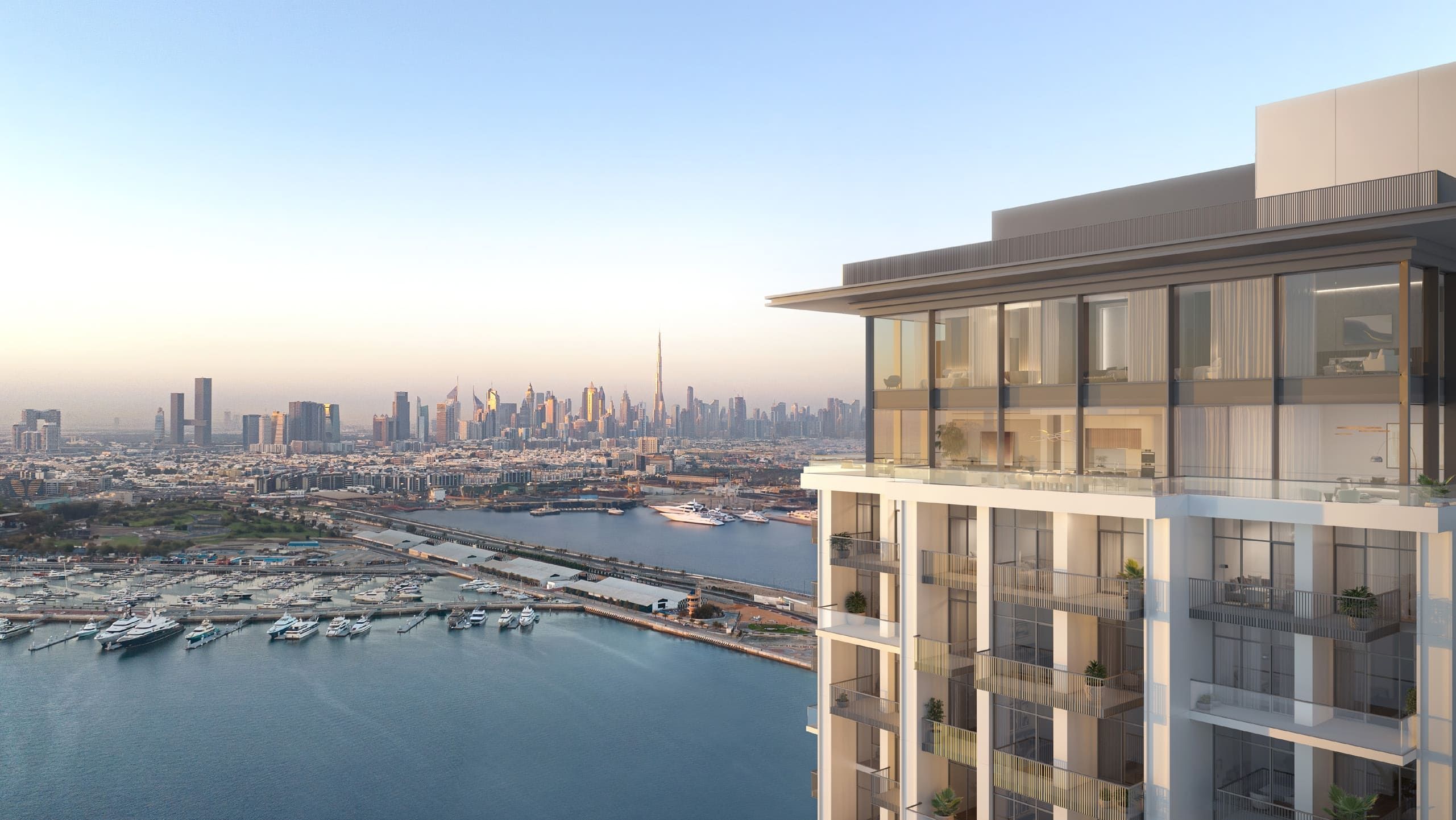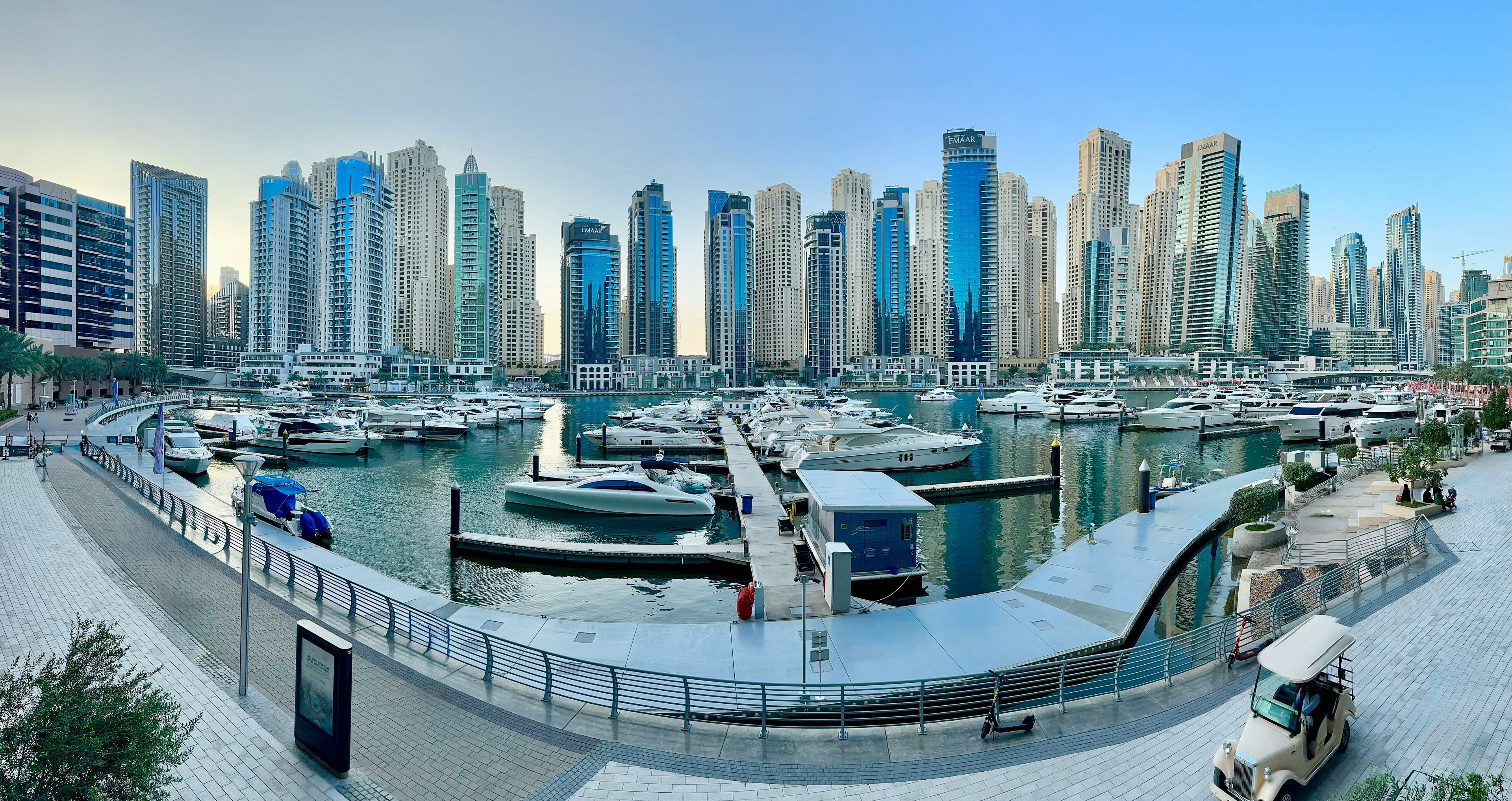No income tax for business owners and a low 9% income tax for companies with an annual income exceeding AED 375,000 – this, along with the transparency of the business market and the attractiveness of the city, encourages many people to relocate their businesses or set up companies in Dubai. How to set up your own business in Dubai and what are the costs of registering a company in Dubai in 2025? Setting up a business in Dubai step by step – welcome to our guide.
Your own business in the United Arab Emirates – is it worth it?
Yes, it is definitely worth starting your own business in Dubai or other UAE emirates, which tempt with a dynamically developing economy and a strategic location between Europe and Asia, providing access to global markets. The city offers an extremely favourable tax system with 0% personal income tax and low corporate tax, as well as simplified registration procedures, which promotes fast development of businesses. With 100% foreign ownership in most sectors, world-class infrastructure and a stable political environment, Dubai provides the ideal conditions for turning innovative ideas into reality. This is a unique opportunity for entrepreneurs to join the ranks of more than 8,000 new companies registered each month and benefit from one of the most business-friendly environments in the world
In Dubai and the United Arab Emirates in general, there are several main legal forms of business activity, which differ in terms of requirements, operational capabilities and benefits. Choosing the right structure is crucial and depends on the type of business, target market, budget and growth plans. The main types are companies operating on the Mainland (continental market), in Free Zones and Offshore companies. Can a foreigner own 100% of a company in Dubai? How does a free zone in Dubai work? Let's take a closer look at the forms of business activity in Dubai:
- Mainland companies (continental):
- They allow free trade on both the local UAE market and internationally, with no restrictions on the area of operation.
- In most sectors, 100% foreign ownership is possible, although in some strategic industries a local partner from the Emirates may still be required. Previously, a local sponsor with a 51% stake was required, but these regulations have changed.
- They require a physical office with a minimum area of 200 square feet, which must be registered in the Ejari system
- They are subject to more stringent regulations and require approvals from different government agencies, as well as mandatory financial audits at the end of each fiscal year
- Examples of legal forms on the Mainland include:
- Limited Liability Company (LLC): This is one of the most popular forms, especially among expats, due to the limited liability of partners to the amount of their contributions and the possibility of full foreign ownership in many industries
- Sole proprietorship: Owned by a single owner who has full control but also bears full responsibility for the company's debts. It requires certain conditions to be met, such as a resident visa for foreigners.
- Partnership Company: Ownership is shared between at least two partners who share profits and losses
- Private/Public Shareholding Company: For larger ventures, requires a minimum of three investors (private) or specific incorporation requirements (public)
- Civil Company: Intended for recognised professionals such as doctors, solicitors, engineers or accountants. Allows 100% ownership by partners and is limited to professional activities
- Branch of a Foreign/Local/GCC Company: Allows the parent company to expand its business into the UAE market, operating under the same name and ownership ◦ They are subject to more stringent regulations and require approvals from different government agencies, as well as mandatory financial audits at the end of each financial year
- Free Zone Companies:
- Offer 100% foreign ownership and tax exemptions (e.g. 0% personal income tax, 0% CIT on profits up to AED 375,000)
- Simplified registration procedures and no currency restrictions
- The main restriction is that the company can only operate within the selected free zone or in international markets. Sales to the UAE market usually require a local distributor or partner
- They often allow for flexible office solutions, such as virtual offices or flexi-desks, although in some cases a physical office is required
- They allow for a residence visa for up to 3 years for the owner and employees, with the possibility of sponsoring family members
- There are over 30 free zones in Dubai, each of which often specialises in specific industries (e.g. technology, media, healthcare). The most important examples of free zones in Dubai are Jebel Ali Free Zone (JAFZA), Dubai Airport Free Zone (DAFZA), Dubai South Free Zone and International Free Zone Authority (IFZA).
- Offshore companies:
- They are treated as virtual companies and are not considered UAE residents
- They allow 100% foreign ownership and asset protection
- They can only conduct business outside the UAE
- They do not require minimum capital and often do not require a visit to the UAE for registration (except for opening a bank account)
- They may have difficulty opening a local bank account
- They cannot hire employees on employment contracts or sell goods to UAE residents
After learning about all the forms of business activity in Dubai, you may ask the question: Can a foreigner set up a company in Dubai without a local partner? Yes, a foreigner can set up a company in Dubai without a local partner, especially by choosing one of the free zones that offer 100% foreign ownership, as well as in most sectors on the Mainland, thanks to recent changes in regulations. And how does a company in a free zone differ from one on the Mainland? The main difference is that a company in a free zone offers 100% foreign ownership and can operate mainly within the free zone or in international markets, while a company on the Mainland has free access to the entire local UAE market and can operate throughout the country, with most sectors also allowing 100% foreign ownership.
What are the steps to setting up a company in Dubai?
- Choosing a business activity: The first and most important step is to determine the type of your business. There are over 2,000 types of economic activities available in the UAE, which affect the type of licence required and the jurisdiction in which you can operate.
- Choosing a jurisdiction – Mainland, Free Zone or Offshore The decision on the location of your business is crucial.
- Choosing a legal structure: Choosing the right structure is crucial and depends on the specifics of your business.
- Reserving a trade name: The company name must be unique, consistent with the business and comply with strict Dubai regulations, including not containing offensive, politically sensitive or religious content, or names associated with global political organisations or already registered brands. This process can be done online or in person.
- Obtaining Initial Approval: Initial approval is the UAE government's consent to proceed with further steps to establish a company, without the possibility of conducting business at this stage. It requires the submission of basic documents such as a copy of your passport, a business registration form and a business plan.
- Preparation of the Memorandum of Association (MoA) or Local Service Agent (LSA) agreement: Depending on the legal form chosen (e.g. LLC, joint stock company), it is necessary to draw up a Memorandum of Association (MoA) which defines the ownership structure, shares and scope of activity. For sole proprietorships, an agreement with a Local Service Agent (LSA) may be required.
- Securing office space: Most companies in Dubai require a physical office address. For companies on the Mainland, the office must be registered with the Ejari system. Companies in Free Zones often have access to more flexible solutions, such as virtual offices, shared spaces (flexi-desks) or fully equipped office rentals.
- Applying for a business licence: Once the documents have been completed and an address secured, an application for the appropriate business licence must be submitted to the Department of Economy and Tourism (DET) for Mainland companies or to the relevant Free Zone authorities. This involves paying the applicable licence fees.
- Opening a corporate bank account: Once you have obtained your licence, you will need to open a corporate bank account in Dubai, which is essential for managing your finances and building credibility. The required documents include your trade licence, company registration documents and copies of the passports of shareholders and directors.
- Applying for visas and work permits: The business owner, employees, and family members must obtain the appropriate residence visas and work permits. Visa types include investor visas (for owners), employee visas (for employees), and family visas (for family members). The number of visas available may depend on the size of the office and the type of licence.
- Registration for corporate tax and VAT purposes: From 1 June 2023, all new companies in the UAE must register for corporate tax (CIT) with the Federal Tax Authority (FTA). The CIT rate is 9% for profits above AED 375,000, and 0% for lower profits. Companies with an annual turnover exceeding AED 375,000 must also register for VAT, which has a standard rate of 5%. Accounting records must be kept and annual financial statements must be submitted.
Please note that specific requirements and processes can be different depending on the type of business and the jurisdiction chosen. It is always advisable to seek the assistance of professional advisors to ensure that your company is registered efficiently and in compliance with the regulations, so that the formalities involved in setting up a company in Dubai run smoothly.
Company registration in the UAE – requirements and documents
Registering a company in the United Arab Emirates (UAE), including Dubai, requires meeting a number of requirements and gathering specific documents, which can be different depending on the chosen jurisdiction (Mainland, Free Zone, Offshore) and the type of business activity. What documents are required to register a business in the UAE? How to open a business in a free zone? Let's answer these key questions:
- Requirements for registering a company in the UAE:
- Choice of business activity
- Choice of jurisdiction
- Choice of legal structure:
- Registration of a trade name
- Obtaining initial approval (Initial Approval)
- Establishing a registered office address
- Obtaining a business licence
- Opening a company bank account
- Visas and work permits
- Tax registration
- Documents required to register a company in the UAE (documents can be different depending on the chosen structure and jurisdiction, but usually include):
- Copies of passports of all shareholders, directors and managers
- Copy of UAE ID card or residence visa (if applicable)
- Licence application form and business registration form
- Information about the company's articles of association / Memorandum of Association (MoA) / Articles of Association (AoA): Required for most companies, they define the ownership structure and scope of activities
- Preliminary project analysis / Business plan: Often required, especially in Free Zones
- Confirmation of trade name reservation
- Initial Approval Receipt (Initial Approval Receipt)
- Office lease agreement (registered in the Ejari system for Mainland companies) or confirmation of flexi-desk rental in a Free Zone
- No Objection Certificate (NOC): If the person applying to set up a company is already a UAE resident and employed, it may be required
- Signature specifications and passport photos
- Board Resolution and Power of Attorney (especially for Free Zones)
- 2 years of financial reports or a reference certificate from a bank (in some cases)
- RIC (Registry Identification Code) registration form for managers
The process may seem complicated, but compared to most European countries, setting up a company in Dubai is really simple. In addition to the company, we also wrote about how to set up a company in Dubai and how much it costs to set up a company in Dubai.
How long does it take to register a company in Dubai?
The time it takes to register a company in Dubai varies greatly, depending on many factors, from the jurisdiction you choose to the complexity of the business itself. Sometimes it is a really quick process, because, for example, through the Basher online platform, you can set up a company in as little as 15 minutes. If you decide to register through the Department of Economic Development (DED), it will usually take about 4 days. In general, the average time to open a company ranges from 1 to 2 weeks. What's more, if you already have all your documents ready and only need simple permits, it can take as little as 3 to 7 working days. Let's explain in more detail what company registration platforms are:
- Basher online platform: a unified online platform that simplifies the entire process by allowing you to set up a company in just 15 minutes. It brings together all local and federal government agencies responsible for issuing business licences in different emirates in one place. This makes the process super fast and easy, as you can do everything online.
- Department of Economic Development (DED): often also referred to as the Department of Economy and Tourism (DET), is the main institution in Dubai responsible for issuing business licences. This is where you submit the required documents, especially if you plan to open a company on the Mainland, i.e. the continental part of Dubai. The DED/DET ensures that your company complies with local regulations and generally regulates the entire business registration process, issuing final trade licences.
Obtaining initial approval can be really quick, which is great because it gives you the green light to move forward. The key factor is whether your company will operate on the Mainland or in the Free Zone, as this affects the procedures and approvals required. The type of business licence you choose – whether commercial, industrial or professional – can also lengthen or shorten the process. If your business requires additional permits from other government agencies (for example, from the Ministry of Interior for driving schools or the Ministry of Justice for legal activities), it will take longer. In summary, the time it takes to register a company in Dubai is flexible and highly dependent on how well you prepare and what type of business you choose. Only when you have obtained all the required licences and business permits in the UAE will you be able to operate legally with your company in Dubai.
A company in Dubai for a foreigner – is it possible?
Yes, it is possible for a foreigner to set up a company in Dubai, and it is even very easy. It is particularly easy to set up a company in free zones such as DMCC, Jebel Ali Free Zone (JAFZA) or Dubai Media City. This is facilitated by 100% ownership for foreigners and remote company registration. The difficulty of the formalities obviously depends on the business you intend to run, but as a foreigner, you can easily set up a company or move your company to Dubai.
Which industries are most commonly registered in Dubai by expats? Expats in Dubai most often set up businesses in industries such as finance, real estate, tourism and technology, as well as construction, trade and logistics. The rapidly developing financial market, investments in real estate, the hotel and catering sector, as well as the increasing role of technology, mean that these areas are seen by foreigners as those with the greatest potential for the development of their own businesses and careers.
A company in Dubai: the example of Two Continents
If starting a business in Dubai seems impossible to you, we can only say – take a look at Two Continents! In just a few years, we have become a company offering all the most important attractions in Dubai, as an owner of accommodation in Dubai in private apartments on the top floors of residential skyscrapers, and selling organised trips to Dubai for thousands of tourists. The road to success in Dubai is not always easy, but persistence and determination help to achieve success.
Questions and answers (FAQ):
- How to set up a company in Dubai?
To start a business in Dubai, you must first choose the type of activity, the appropriate jurisdiction (e.g. Free Zone or Mainland) and the legal structure of the company. Then, you need to register a trade name, obtain preliminary approval and a business licence, and open a company bank account.
- How much does it cost to start a business in Dubai in 2025?
The costs of setting up a company in Dubai in 2025 vary and average between AED 10,000 and AED 40,000. The final price depends on the chosen jurisdiction (Mainland or Free Zone), type of business, legal structure, licence fees, office rental and visa costs.
- Do you need a resident visa to run a business in Dubai?
A resident visa is not always required to set up a company in Dubai, especially in free zones, which often allow you to set up a company without the initial need for a resident visa. However, in order to legally live in a flat, work in Dubai, or open a corporate bank account without restrictions, obtaining an investor or employee visa becomes essential.












